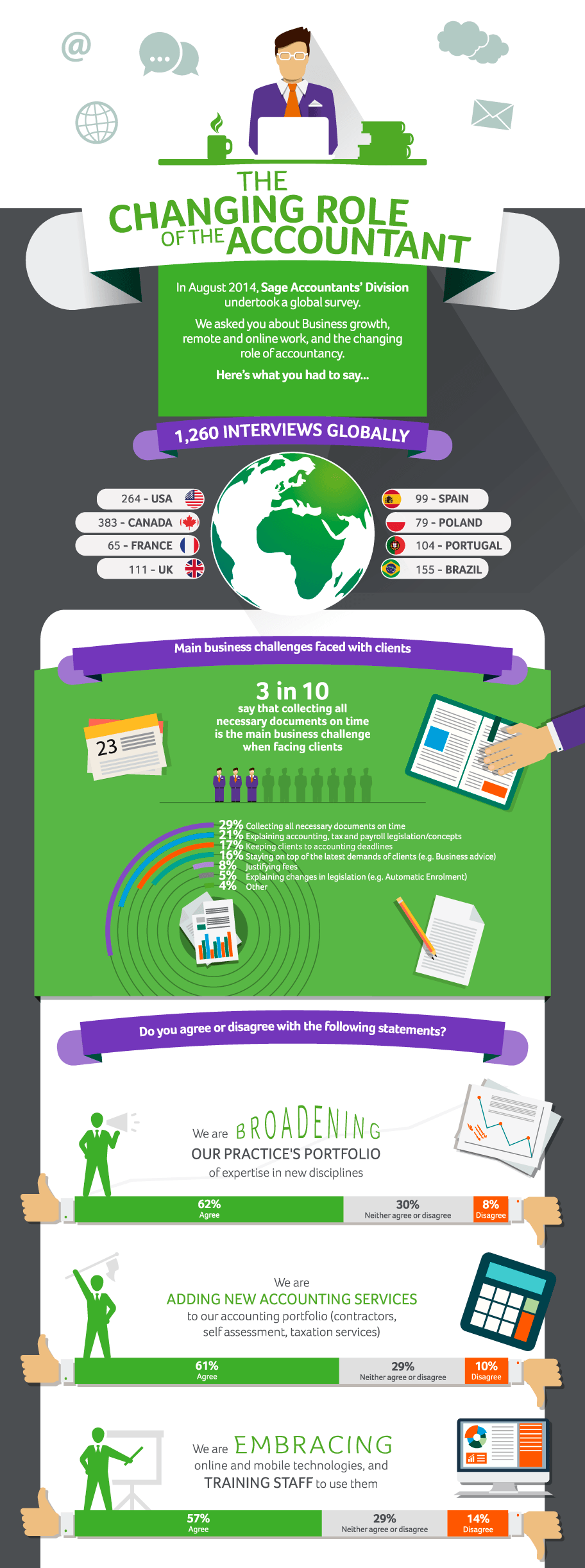The changing role of the accountant

Accounting has been called “the language of business” and the accountant in practice provides key areas of business support including financial accounting, tax, compliance, management accounting, auditing, financial systems, business planning, forecasting, payroll and more.
But is the role of the accountant changing? And how can businesses benefit from this change? Technology, the internet, improved accounts and tax software has changed the way accountants work and brought efficiencies to accountancy practices.
The cloud means that accountants can collaborate and work with clients in real time. Expectations of clients are changing. Accountancy practices are adding new services to their practice portfolio, and emerging new breeds of accountants bring other skills and business knowledge to help clients beyond the numbers.
Technology
In the “olden days” pre-computer, when dinosaurs roamed the streets, accounting was processed manually with paper and pencil. Transactions were recorded in columnar papers. Columns had to be added up, numbers moved from one page to the next, and trial balance and financial statements were compiled manually.
Like many industries, computerisation and the internet have changed the accounting profession. The concepts remain the same but the mechanics moved from paper to computer to online. Accounting software continually develop cutting edge software that help businesses to get the best from technology by improving the way businesses work, adding efficiencies to business processes and adding value to data.
Cloud accounting
Cloud accounting is the latest technological breakthrough in accountancy. Working in the cloud with products such as accounting software means data is available online anytime and anywhere. Business owners can keep their finances up to date and review business performance from any internet enabled device, including PCs, Macs, smartphones and tablet devices.
The accountant-client relationship becomes more collaborative with the cloud enabling a real-time working relationship where the accountant can provide clients with more frequent insights into their business to help them monitor performance, make decisions and plan.
Value-added services
Accountants are embracing opportunities to differentiate their practices and move towards value-added services and a portfolio of business skills including HR, technology, marketing and leadership to help clients beyond the numbers.
The client-accountant relationship is a partnership, with accountants caring about the success of clients’ businesses and providing a great deal of essential support.
Choice
“Choosing an accountant is a little bit like choosing your life partner – someone who is there for the long haul who will take the journey to success with you.” (Paul Tooth, Accounting Web)
The word “choice” is key. As accountancy continues to evolve, business owners can benefit from more choice in the type and level of support they can expect from an accountant. Traditional year-end and compliance services remain a very important core service, and accountants are a valuable resource of knowledge and expertise.
They help clients achieve their business goals. Help them make their business work better. An accountant is a trusted business friend. Talk the language of business together.






Ask the author a question or share your advice